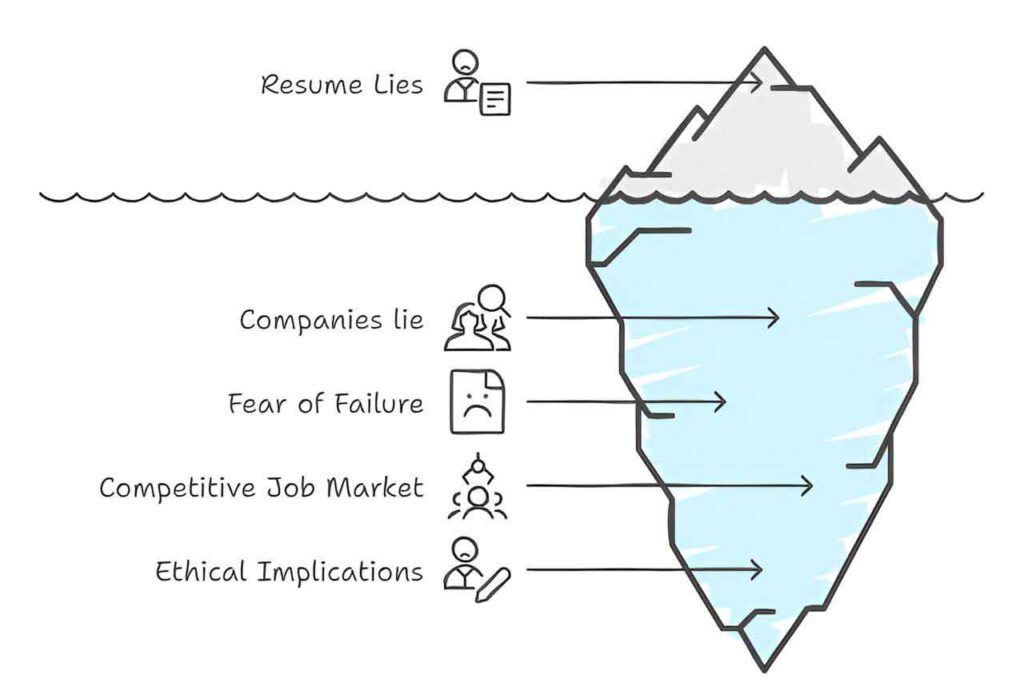The job market can be a challenging arena, and for many job seekers, the pressure to stand out often leads to difficult decisions. Research shows that 70% of job applicants have lied or would consider lying on their resumes, highlighting the lengths people go to in securing employment. Surprisingly, 29% of those who were hired after lying on their resumes reported facing no consequences.
While these numbers may seem to justify bending the truth, lying on your resume also comes with serious risks. However, for those considering this route, it is essential to understand the implications fully and explore a safer, more strategic approach while avoiding mistakes that could affect you before and after getting the job.
Note: For the sake of transparency, this article does not encourage lying in any way. It merely provides greater clarity and reduces the consequences for those who decide to do so.
I. Why Candidates Are Considering Lying on Their Resumes
The job market has grown increasingly competitive, leaving many job seekers feeling pressured to enhance their resumes to secure opportunities. Studies show that employers receive hundreds of applications for a single role, making it harder for candidates to stand out. This reality pushes many candidates to exaggerate or fabricate credentials and skills to pass initial screenings and get the job.
Moreover, job seekers are not the only ones stretching the truth. Companies are also guilty of misrepresentation, often exaggerating benefits, minimizing job responsibilities, or providing misleading job descriptions. Job seekers frequently report being ghosted after interviews, leading to frustration and a loss of trust in the recruitment process. These dynamics create a cycle of dishonesty where both parties feel justified in misrepresenting themselves.
The current state of the job market, characterized by uncertainty and economic challenges, exacerbates this issue. Candidates may resort to lying as a last resort, seeing it as the only way to compete effectively.
II. The Cost of Lying Before and After Getting the Job
Besides being something immoral, when candidates lie on their resumes, they expose themselves to scrutiny during interviews. Hiring managers often ask detailed questions to verify skills and experience. If a candidate cannot confidently address these queries, it raises red flags, reducing their chances of being hired.
Even if the lie goes unnoticed during the interview process, the risks persist after landing the job. Employers may expect candidates to perform tasks based on the skills or achievements they claimed. Failing to meet these expectations can lead to poor performance reviews, damaged professional relationships, and even termination.

Also Read: 10 Resume Do’s and Don’ts That Can Make or Break Your Application
III. Smart Alternatives Before Lying
Instead of directly lying on your resume, there are more strategic and ethical ways to present your qualifications. These approaches allow you to highlight your strengths while addressing gaps or limitations in your experience.
1. Stretch the Truth Without Crossing the Line
Stretching the truth involves presenting your experience in the most favorable light without misrepresentation. For instance, if you worked on a team that achieved a significant milestone, you can highlight your role within that success. Instead of saying, “I managed the entire project,” you can state, “Contributed to a team project that delivered a 20% increase in efficiency.” This approach emphasizes your involvement without claiming responsibility for tasks you didn’t perform.
2. Focus on Transferable Skills
Transferable skills are abilities gained from one role that are applicable to another. If you lack direct experience in a specific industry, identify skills from previous jobs that align with the new role. For example, if you’re applying for a project management position and have no formal experience, you can highlight organizational skills, leadership, and time management from past roles. Phrases like “Successfully coordinated and led cross-functional teams” showcase relevant skills without fabricating credentials.
3. Tailor Your Resume to Match the Job Description
Customizing your resume for each application is a powerful way to showcase your qualifications honestly. Study the job description carefully and emphasize areas where your experience aligns. If the job requires proficiency in a particular software and you have basic knowledge, state your experience as “Working knowledge of [Software Name]” instead of overstating your expertise. This demonstrates honesty while signaling potential to grow in the role.
4. Use Action-Oriented Language
Strong, action-oriented language can make your accomplishments more compelling without exaggeration. Replace generic statements like “Assisted in customer service” with “Resolved 50+ customer inquiries daily, achieving a 95% satisfaction rate.” This approach highlights your contributions and results in a professional and impactful way.
5. Address Gaps with Transparency
Employment gaps are a common concern for job seekers. Instead of lying to fill these periods, address them directly and constructively. For instance, if you took time off for professional development, you could write, “Pursued advanced certifications in [Field] during a career transition.” This reframes gaps as intentional steps toward career growth rather than periods of inactivity.
IV. If You Decide to Lie, Consider This
If you choose this path, it’s crucial to approach it thoughtfully and responsibly. Here are essential considerations to minimize risks and potential consequences.
1. Never Lie in Sensitive Sectors
Certain sectors, such as healthcare, education, engineering, or legal professions, require absolute integrity due to the potential consequences of misinformation. For example, lying about medical credentials or engineering expertise can lead to significant harm, not just to your career but to the lives and well-being of others. In these fields, even minor discrepancies can result in legal repercussions and a permanent loss of credibility. It is vital to avoid any fabrications in sectors where trust, ethics, and precision are paramount.
2. Choose Wisely What to Lie About
If you feel compelled to fabricate information, focus on areas that are less likely to be directly tested or scrutinized. For instance, exaggerating a soft skill experience might be less risky than lying about a technical skill you’ll need to demonstrate on the job. Avoid fabricating achievements that can easily be verified, such as college degrees or job titles.
3. Avoid Lying About Core Responsibilities You Will Perform
Lying about tasks or skills directly relevant to the role is particularly dangerous. Employers often assess candidates based on their ability to handle specific responsibilities, both during interviews and after hiring. For instance, if you claim expertise in managing financial systems and are later unable to deliver, it could lead to immediate dismissal. Focus on highlighting transferable skills or areas where you can quickly learn and adapt.
4. Prepare Detailed and Consistent Answers
If you decide to include fabricated points on your resume, you must prepare thoroughly to defend them. Review your resume carefully and anticipate questions related to any areas you’ve exaggerated. For example, if you’ve overstated your role in a project, be ready to discuss the specifics of your contributions convincingly. Consistency is key, conflicting details between your resume, cover letter, or interview answers can raise red flags.
5. Avoid Overloading Your Resume With Fabrications
Lying about one or two aspects of your experience might seem manageable, but piling on fabrications increases the likelihood of being caught. Stick to one or two points you feel are absolutely necessary and keep the rest of your resume honest and accurate. A well-rounded resume with genuine accomplishments will be more convincing than one riddled with falsehoods.
While lying is never the ideal solution, these tips can help mitigate the risks for those who feel they have no other option. Ultimately, a combination of honesty, strategic presentation, and skill development is the best approach to securing meaningful and lasting employment and career.



